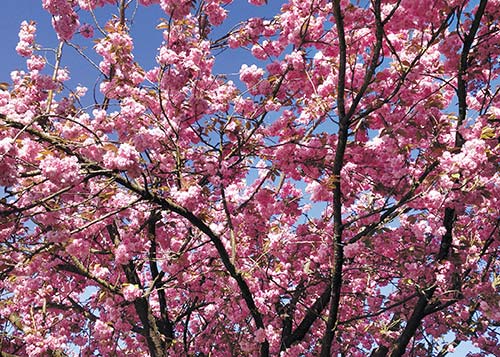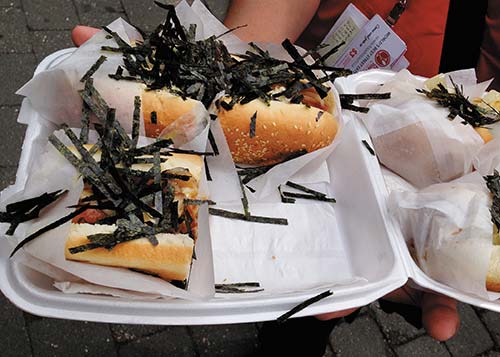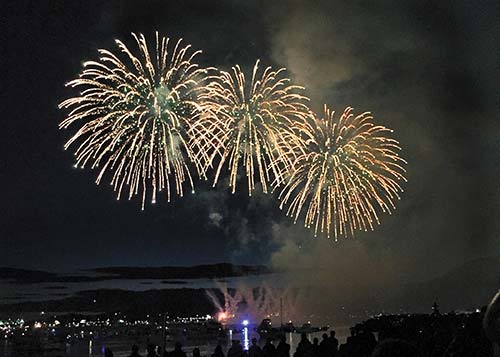
springtime blossoms on Main Street
High season in Vancouver and Victoria runs from May through October, when the weather is generally warm and relatively dry. July and August are the region’s peak travel months, with the sunny, temperate conditions balancing out the big crowds and high prices. In summer, the comfortable daytime temperatures rarely rise above 75°F (24°C), and the sun doesn’t set until after 9pm.

springtime blossoms on Main Street
Prices may be somewhat more moderate in spring (April through June) and fall (September through October), although you can expect more rain than in midsummer.
During the winter months of November through February, prices are lowest; except during the Christmas/New Year’s holidays, accommodations can drop to half of their summertime rates. The cultural calendar is full with theater, music, and other arts events, and you can ski on the local mountains or just two hours away at Whistler-Blackcomb. Daytime temperatures in the city average 43-46°F (6-8°C) during the winter. The trade-off is that winter is the rainy season, with rain—sometimes quite heavy—and clouds most days. Snow typically falls only at higher elevations, although it occasionally snows in the city.
Visitors to Canada must have a valid passport. U.S. citizens entering Canada by land can use a NEXUS card or U.S. Passport Card instead, but note that these documents aren’t valid for air travel.
Depending on your country of origin, you may also need either a visitor visa or an Electronic Travel Authorization (eTA). See more information in the “Essentials” chapter of this guide, and check with Citizenship and Immigration Canada (www.cic.gc.ca) to confirm what documents you require.
Vancouver International Airport is south of downtown in the suburb of Richmond. The Canada Line subway stops right at the airport and can take you downtown in just 25 minutes.
Visitors arriving by train or bus come into Pacific Central Station on the edge of Chinatown. Cabs typically wait outside the station. To get downtown, you can also catch the SkyTrain from Main Street Station, which is one block from the train and bus depot.
Vancouver has a very good public transit system, with subway lines, buses, and ferries that can take you almost everywhere around the city. You don’t need a car to explore most city attractions. A car is useful, though not essential, for excursions around the North Shore mountains or up the Sea-to-Sky Highway to Whistler. You can get to Victoria from Vancouver without a car on the BC Ferries Connector, a combination bus-ferry-bus route.
If you’re traveling in the summer, particularly in July and August, book your hotel reservations in advance. Car reservations are recommended on BC Ferries trips between Vancouver and Victoria in the summer as well.
Many Vancouver restaurants fill up with advance reservations, particularly on Friday and Saturday nights. Book a weekend table at least a few of days ahead of time; most local eateries take reservations online. Don’t despair if you can’t get a reservation, though, since many spots save room for walk-ins, too.
Many Vancouver attractions offer discounted admission for seniors (age 65 and up), students, and families, typically including two adults and up to two children.
If you’re going to visit several attractions on the University of British Columbia campus, the UBC Museums and Gardens Pass (adults $33, seniors, students, and children $28) can save you money. It includes admission to the Museum of Anthropology, Nitobe Japanese Garden, UBC Botanical Garden, and Beaty Biodiversity Museum, as well as a 10 percent discount on the Greenheart TreeWalk. Purchase the pass at any of the participating attractions.
Several companies offer Vancouver city tours or explorations of particular neighborhoods, including Tours by Locals (www.toursbylocals.com) and Context Travel (www.contexttravel.com). For a guided tour by bike, contact Cycle City Tours (http://cyclevancouver.com) or Vancouver Bike Tours (http://biketourvancouver.com).
A unique way to tour the city is with Vancouver Photowalks (www.vancouverphotowalks.ca), which offers guided photography tours of Stanley Park, Gastown, and other districts.
Vancouver Foodie Tours (http://foodietours.ca) runs several excellent and entertaining food tours, including an eating tour of Granville Island and an exploration of the city’s food truck scene. Off the Eaten Track (http://offtheeatentracktours.ca) offers local food walks in Main Street and Railtown (east of Gastown), as well as an East Village brunch tour.

samples from Japadog on a Vancouver Foodie Tour
Want to forage in the rainforest for wild edibles or learn to catch your own crab? Contact Swallow Tail Culinary Adventures (http://www.swallowtail.ca), which also organizes pop-up dinners and other food events. Vancouver Brewery Tours (http://vancouverbrewerytours.com) runs regular tasting tours of the city’s craft breweries.
The nonprofit Vancouver Heritage Foundation (www.vancouverheritagefoundation.org) offers periodic walking tours of different Vancouver neighborhoods, focusing on the architecture and history of each community. Other options for architecture buffs are the Architectural Walking Tours that the Architectural Institute of BC (http://aibc.ca) runs throughout July and August.
Dozens of restaurants offer special menus, and you can join in food events, from chef dinners and wine-tastings to food tours, during Dine Out Vancouver (www.dineoutvancouver.com, Jan.), the city’s annual celebration of dining that has grown into one of Canada’s largest food and drink festivals.
With its large Asian population, Vancouver hosts plenty of festivities to mark the Lunar New Year (Jan.-Feb.), including parades, lion dances, music, fireworks, and other special events held in Chinatown and throughout Richmond.
A good introduction to the region’s growing microbrewery scene, the annual Vancouver Craft Beer Week (http://vancouvercraftbeerweek.com, May-June) includes tasting events and other activities that showcase small brewers and their products.
With nearly two weeks of concerts around the city, from big-name big-ticket shows to free music in the park, the TD Vancouver International Jazz Festival (www.coastaljazz.ca, June-July) has tunes for any jazz, Latin, funk, and world music lover.
Vancouver celebrates Canada’s birthday, Canada Day (www.canadaplace.ca, July 1), with a parade, outdoor concerts, and celebratory fireworks over Burrard Inlet. Canada Place is the center of the festivities.
It’s not just folk music at the long-established Vancouver Folk Festival (http://thefestival.bc.ca, July). This musical extravaganza draws world beat, roots, blues, and yes, folk musicians from across Canada and around the world to Jericho Beach for three days of always-eclectic music on multiple outdoor stages. It’s great fun for all ages.
Fireworks displays over English Bay bring thousands of Vancouverites and visitors out for the Celebration of Light (http://hondacelebrationoflight.com, July-Aug.) that takes place over several summer evenings. The best viewing spots are at English Bay Beach, but you can see them from Kitsilano Beach and other points around False Creek.

the annual Celebration of Light over English Bay
The Vancouver Pride Festival (http://vancouverpride.ca, July-Aug.) features more than 20 events celebrating the city’s large gay, lesbian, bisexual, and transgender community, culminating in a festive parade through the downtown streets.
For two weeks, the Vancouver Fringe Festival (www.vancouverfringe.com, Sept.) takes over Granville Island and other stages around town with innovative, quirky, and often surprising theater, comedy, puppetry, and storytelling performances.
The VanDusen Botanical Garden marks the holiday season with its annual Festival of Lights (http://vandusengarden.org, Dec.), illuminating its garden paths with thousands of sparkling lights.